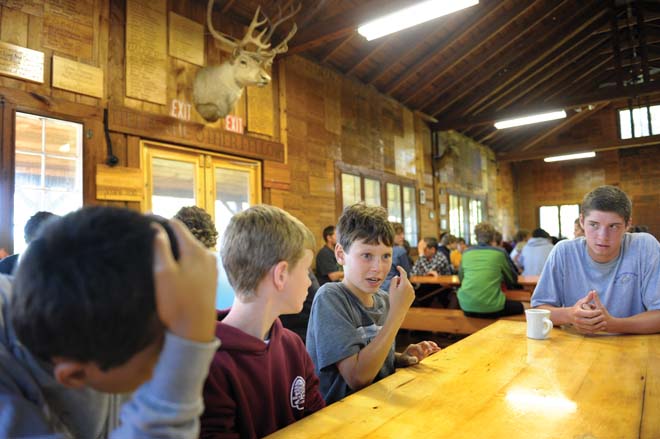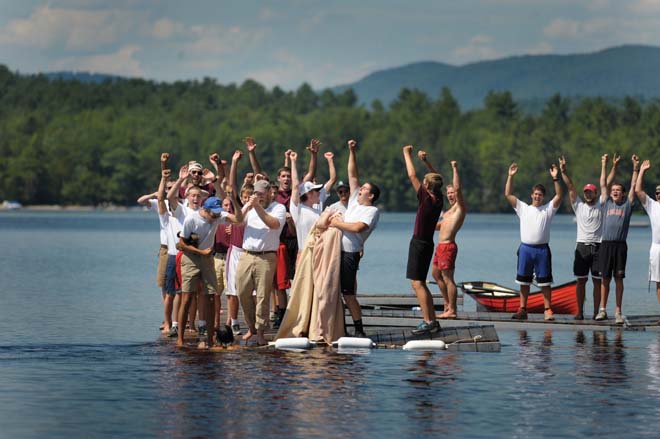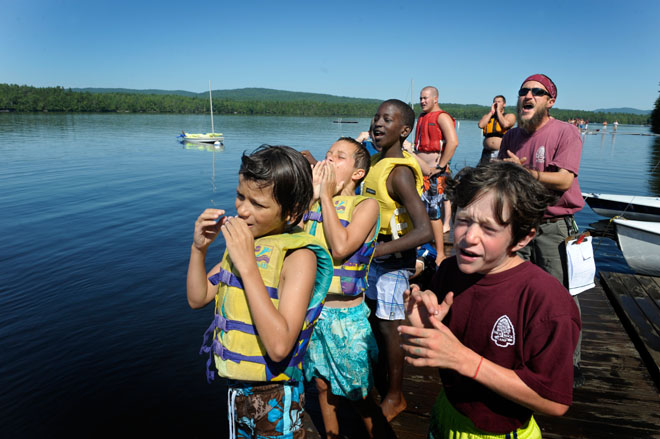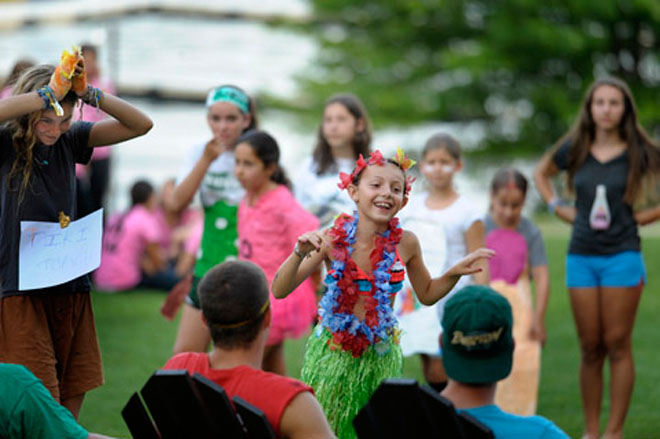To Help the Other Fellow
FEATURE-January 2013
by Jaed Coffin
Photographs by Fred Field
Birch Rock Camp is making modern boys into old-fashioned men.
“Swim, Neutron, swim!” It’s a sunny midmorning down at the waterfront at Birch Rock Camp, and Nate, 15, of Scarborough—nickname: “Neutron”—has been swimming the five-mile circumference of Lake McWain for about two and a half hours. Two counselors in a small white dinghy row quietly behind him while 85 boys wearing tucked-in maroon camp shirts cheer him on from floats. Earlier that morning, Neutron coated himself in Crisco and stripped down before embarking on the most renowned of the camp’s swimming challenges: the Whale. Only a handful of boys attempts the Whale each summer (the names of those who complete it are carved into plaques in the dining hall), but every Birch Rock boy swims a distance appropriate to his ability. The Seal challenge requires a two mile swim across the length of Lake McWain; the Loon is out and back across the width, and the Duck is a one-way crossing of the lake accompanied by a rower who’ll trade places for the return.
Now the chant shifts: “Neu-tron! Neu-tron!”
Neutron, who aspires to attend the Naval Academy, surges through the final stretch. As he slaps his hand on the raft, a boy at the end of the dock dives into the lake to begin his own Whale. His pace is calm and steady. He chats casually with the rowers who stay a few feet to his left.
Several counselors wrap Neutron in towels. He steadies himself for a moment before jogging to shore through a cheering human tunnel. The younger campers—at Birch Rock, boys range in age from 7–15 years old—offer high fives and hugs. One boy remains on the end of the float, gazing thoughtfully at the calm surface of Lake McWain. He is 14-year-old Christian, from the Bronx, New York City, and before coming to Birch Rock, Christian hadn’t done much swimming. This afternoon he’ll set off to conquer the Seal. It’s the last week of camp, and facing the swim challenge is something he’s been thinking about “all summer.”
Christian looks nervous. I ask him how he’s feeling. He nods slowly. “It should be pretty solid,” he says. Then he smiles. “I’m shooting for 1:20. I want to beat my bro’s time of 1:45.”
Meanwhile, one of the counselors chants the opening notes of the “Birch Rock Cheer” then lets the boys do the rest:
“B-I-R! C-H-R! O-C-K! Ra! Ra! Ra!
Yeeaahhh Neutron!”
All of this unironic cheering and fraternalism and good clean non-technological fun is not a memory from a different, simpler era. It’s happening in the present at summer camps all across Maine, and Birch Rock Camp has been at the forefront of this unique heritage since 1926. Located in Waterford, the camp was founded by William “Chief” Brewster and his wife, Onie, with a specific vision: to cultivate in young men a sense of self-reliance and independence that they couldn’t get in a traditional education. Such virtues, Chief and Onie believed, could be developed through intense engagement with the natural world, and through an ethos of friendship and community. Two mottos at Birch Rock instill in campers the Brewsters’ legacy: Help the Other Fellow, and Shake a Hand, Make a Friend.
The camp is named after a birch tree that grows improbably from a boulder on the shore of Lake McWain. During the first summer the Brewsters ran the camp, there were 13 campers. The number doubled the next year, and tripled the following year. There was a brief period in the 1990s when Birch Rock—along with many other summer camps in Maine—nearly went out of business. Camp director Rich Deering, a Birch Rock camper since he was nine years old, cites the competition of single-focus sports camps. The number of campers dwindled into the low twenties. But the last decade has seen a major resurgence in the life of Birch Rock. Of the 85 campers this year—the boys come from 12 different countries and across America from Florida to California—roughly 40 percent come from Maine, and 23 percent attend on a need-based financial scholarship. Each summer, Deering anticipates a camper return rate of no less than 82 percent.
Earlier this morning, as I sat at a breakfast of biscuits and gravy and eggs with 15-year-old Eli—he’s the great grandson of Chief Brewster, and a counselor-in-training—he pointed out other camp mottos adorning the walls: Make it Happen, Lead By Example, and Step Up, Step Back. Eli sat at the head of the table among several other boys of various ages whom he classified, in ascending order of age, as “otters, bobcats, wolves, and bears.” I asked one of the younger boys, Wes from Greenwich, Connecticut, if he was looking forward to going home at the end of the week.
“I get more homesick of here,” he said, shrugging and looking at the boys across the table. “I miss seeing all of these guys.” Cole, from St. Petersburg, Florida, is a third generation camper who, before his first year at Birch Rock, was told by his father that “all his important life lessons came from summers at Birch Rock.”
As the boys clear platters of food and stack dishes, they take turns telling me various pieces of camp lore. The moose head high on the wall is said to have come from a moose who charged into the dining hall one winter. The McWain Monster is a legendary serpentine beast who lives in the lake. Three-Fingered Willie is a hermit who lives in a shack in the nearby woods. His eyes are sewn shut, but he sometimes climbs the roofs of cabins to have a look inside. The Midnight Phantom has been known to shave boys’ heads in the middle of the night.
Before the meal ended, Ryan Massey, the head counselor who comes to Maine from Oregon every summer, called out several announcements: a baseball game, a mountain biking badge opportunity, and a Wilderness Survival 101 class. A boy stepped forward to introduce his very shy eight-year-old brother, who was visiting for the day.
“Remember!” Massey told the campers, an arm around the newbie. “Shake a hand, make a friend!”
It’s coming up on noon. Up the hill from the waterfront, several boys are sitting around smoking fire pits, deeply engaged in a series of activities referred to as Campcraft. Behind the boys is a small lean-to, the walls of which are adorned with coils of rope, hatchets, cast iron pots and pans, leaf identification charts, compasses, and binoculars, and bow drills for making matchless “friction fires.”
One of the boys, Emanuel, has come to Birch Rock all the way from Milan, Italy. Dressed in knee-high socks, felt loafers, and high shorts, “Le-le”—as he’s known at camp—might not be a typical Birch Rock camper, but here on the hill he faces the same challenges as everyone else. He’s sitting in the dirt, hunched over a pile of carefully arranged sticks while blowing on a small bed of embers. He’s trying to earn his Fire Rights, a certification that would allow him to make fires around camp when needed. Le-le failed his last Fire Rights test—”Didn’t give the flames enough air,” he tells me dolefully—but this time, things look more promising. The embers glow, a thin wisp of smoke rises through his kindling, and Le-le steps back.
The flame stalls, and Le-le frowns. Naropa, a counselor-in-training advising Le-le, keeps his spirits up. “Don’t worry, Le-le!” he says. “You’ve got embers!”
One fire pit to the right, William is practicing for his Knife Rights certification. “Excuse me,” he says, as he unsheathes his blade. “You’re in my blood zone.” The blood zone is the length of one’s arm plus another two feet. I step back.
While William works on a fuzz stick—a six-inch length of notched wood that can be used as kindling or a tent stake—I ask him if he plans on bringing any of these knife skills back to his life at home. “I’ll try,” William says. “But my mom is kind of protective. I don’t know if she’ll buy me matches just so I can light a fire.” He’d like to carry a knife around on his belt, but isn’t sure it would be feasible back in suburban life. “Having a knife makes me feel protected when I’m in the woods,” he says. “I know I have something to secure me if anything happens.” William then tells me, as if reminding himself, “but a knife is a tool, not a weapon.”
Next to William, Caleb, from Brooklyn, New York, is making tea out of wintergreen leaves and blackberries that he picked from a patch behind the lean-to. “I call it mint-berry tea,” he says. Moments later, he’s boiling the leaves and berries in water over a fire, and pouring himself a steaming brew. This preparation is part of “Wild Food Day” when campers are encouraged to eat only what they can scavenge from the forest, including frogs, chipmunks, and squirrels.
Many of the other activities at Birch Rock—sports such as basketball and lacrosse, an Avid Reader badge—require three steps for completion. A fully realized Campcraft graduate, however, can complete a fourth level called Ranger—the highest honor at Birch Rock. A Ranger can tie over a dozen knots blindfolded while treading water, can make debris shelters, can chop and split wood, can start a fire without using matches or a lighter. The final test of a Ranger is a one-night solo. He’ll bring with him just seven items: sleeping bag, tarp, food, water, whistle, knife, and fire-making supplies.
Ryan Massey—aka Ryno—has been the guru of Campcraft culture at Birch Rock. He takes me down a lightly trodden trail in the woods, where Patrick, from New Jersey, is in the middle of some “secret training.” Patrick is one of the few campers who has devoted himself to completing the full cycle of Campcraft. Tonight he’ll be attempting to pass his Ranger test.
I ask him twice to let me in on what he’s learning, but Patrick—of sturdy athletic build, with the steely gaze of a future Navy Seal—just shakes his head. Instead, he gives me a brief demonstration of how to make a fire with a bow drill. In seconds, smoke rises out of his hands like magic. I ask him if he’s nervous about his solo tonight.
“Very,” he says. “It’s a scary idea, being alone in the woods. But it’s so different than anything else I do back home. It builds my self-esteem.”
I ask him what he’ll do in the hours before he sets off on his own.
“Rest,” he says. “Clear my mind.”
Around noon, I join a gang of boys playing Magic: The Gathering—a card-trading game that I remember playing in junior high, and which I stopped playing about the same time that some of the kids in my neighborhood got Internet access at home. It’s hard not to assume that the minute these boys go back to their regular lives, they’ll become, well, normal American technology-obsessed boys again. At Birch Rock, iPads, cell phones, and computers are forbidden. Boys aren’t even allowed to bring watches.
“Last summer,” one boy tells me, “I didn’t know what to do with myself when I got home. I tried to play video games, but I just couldn’t do it.”
At 12:45, the boys line up for lunch; today, it’s tomato soup and grilled cheese. While standing in line, Ryno points to a young man named Asa. From this distance, Asa looks like any other boy at Birch Rock, except maybe for the very thin single braid of hair that trails down his back.
“He started growing the braid when his father died,” Massey tells me. “He was eight years old. Now, he’s latched right on to Campcraft.” Ryno’s expression softens from that of a go-mode counselor to a big brother. “I think he realized that he was going to have to learn to be a little more self-sufficient, he was going to have to become a man. Now, Asa knows how to swing an ax, use a knife, swim across a lake, make a fire. He’s going to walk out of here with a little more swagger. The other day,” Ryno says, “Asa said he was going to cut off the braid after he finished his Ranger solo.”
The sun is high. Soon, the boys will have a rest period before going on to their afternoon activities. Some will go into the library and play chess or read; others will return to their cabins for a nap. Then, one boy points across the distance to Lake McWain.
“I see him!” he says. “The Whale’s coming in!”
The line of boys ticks clock-like to the right. Four days from now, all these boys will return to their modern lives in towns and cities across America, in countries around the world.
The boys slowly break rank. In gangs of three and four, Asa and the rest of the Birch Rock campers flood downhill toward the waterfront rafts, jogging and strolling and laughing and lunch-less, beholden now only by the promise of Lake McWain.

















